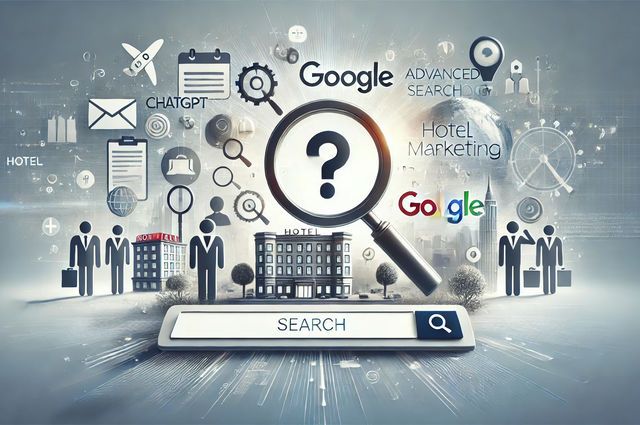Is the new ChatGPT Search a significant threat to Google?
14 experts shared their view
Recently, ChatGPT launched its much awaited search engine, allowing for the first time its users to get the latest information and content available on the Internet. ChatGPT is not the first generative AI company to try and rival Google with an AI-powered search engine. Perplexity, a Jeff Bezos-backed startup, also calls itself "an AI search engine."
Some industry experts called this latest developments "a significant threat to Google."
Google, of course, is not sitting still in the midst of this genAI craze and has already launched its own generative AI - Gemini AI - as part of its search engine results. Google features Gemini AI answers to questions and content summaries at the top of the SERPS (search engine results pages), in the "Answer Box"
The question is, are the new genAI search engines like ChatGPT Search and Perplexity a real threat to Google?
ChatGPT Search is definitely a threat to Google as people will look to keep it "all in one app" by melding search functionality with ChatGPT's core content generation functionality.
That said, what's more pertinent to hotels is,
How will these AI search tools impact travel?"In answering this, just think back to your own last work trip or vacation. Think about all the time (or your EA's time) that you spent in securing flights with the least friction, finding a hotel that met your specific needs (boutique, spacious lobby work setup, rooftop bar, in-room wellness amenities etc), sorting through ground transport, arranging meetings at restaurants or other locations. It's a ton of time, but also there are so many options (read: decision fatigue).Having a tool that can interpret your conversationally structured language to help narrow the field of view and help expedite this process will be incredibly valuable for travelers in any segment. It's then up to hotels to reorient their content, offerings and integrations to cater to these tools...
The threat by the genAI search engines has to be taken seriously and this is exactly what Google is doing.
First, Gemini AI and its latest version Gemini 1.5-pro-002 is comparable to OpenAI's GPT-4o and better in more complex tasks like coding and problem-solving.
Second, Google is much more than search. Gemini AI is already seamlessly integrated with Google's advertising ecosystem, where all advertising formats are intertwined and work in concert. User engagements in the upper funnel (SEO, content marketing, YouTube TrueView, Gmail Ads, etc.) influences conversions in the lower funnel (Google Ads, Google Hotel Ads, Google Display Network, RLSA, Customer Match, etc.), and a campaign in one advertising format directly influences the results from all other formats.As of October 2024, Google's share of the global search engine market is 90.01%. Gemini AI has already been made available to Google's 84 billion monthly users - compare this to ChatGPT's 121 million users! Over 684 times difference!
Last year Google generated $238 billion in revenue from its advertising. Advertisers are loving it! No wonder, out of $1 trillion spent on global advertising this year, almost half of this will be spent with Google and Facebook.
It's an interesting situation. Those who've always had the information and also the commerce. Versus those that have started with the information retasked to be more informative. But not yet the commerce.
My view is that the more informative information coupled with commerce will prove out in the end. This leaves the question of what ChatGPT (and others) will do about the commerce side of the equation moving forwards.
Downstream, the greater focus is how to be found in a world where the return of information from search is transforming quite rapidly. How will a business be found, if we are not essentially seeing a list of relevant links/commerce providers?
Back to the two pane with GenAI on one side and traditional related links on the other? I wonder. Edge looks a little this way now.
When voice search fully kicks in things will be tougher again. Particularly on a mobile platform.
The future is so bright....!
With Google already offering its Gemini AI answers at the top of the SERPs, this will satisfy most users who can interact with that service during their search engine activities. Users of ChatGPT and other AI platforms may prefer to conduct their search within those applications, but I don't expect there to be a big percentage of users migrating from Google search to AI for their search needs.
I would say generative AI is one amongst many elements that are becoming significant threats to Google. The very notion of search engines, in fact, is thrown into question mode as we are seeing the digitial landscape evolving.
Generative AI such as ChatGPT (with its SearchGPT component), Perplexity, Claude, Poe or other similar tools are going mainstream and do, indeed, pose a threat to traditional search engines such as Google. That model has barely changed in over 25 years, with a search query yielding a series of links, making it difficult to find results, specially in the travel sphere and its complex ecosystem of players - lodging, transportation, activties, restaurants, etc.
Yet we mustn't forget Google was already under threat with the uprising of social media search, in particular with TikTok, Instagram and YouTube being much more popular platforms for users under 35 years old. In that sense, generative AI is simply adding another layer to this changing environment.
However, Google will not sit idle and has already begun integrating AI within its platform with AI Overviews. But will it be too little, too late? For younger travelers, already functioning outside of the Googlesphere, it may be already too late...
When it comes to succeeding, it's not enough to simply build a better mousetrap. Those of a certain generation will remember that while Betamax was far technically superior, but VHS won the battle of the video cassette recorder simply because of better access to the market.
ChatGPT has over 180 million users, but less than 7% use it on a daily basis. Google has over 3 billion users, with over 80% using it at least daily on their computers, cellphones and other devices. So Google, and its ever evolving solutions, is in the consumer's face, multiple times per day.
Unless ChatGPT can come up with something truely compelling, that offers vastly superior value to consumers, its effect will be minor. Here, as in many other cases, access and familiarity trump features, meaning Google has little to worry about in the short run.
A significant number of the Gen Y/Gen Z population are now turning to TikTok instead of Google when searching for information. In fact, nearly 40% of them prefer TikTok over Google for searches, according to Google's own data. This shift indicates a transformation in how search engines are being used and perceived. With ChatGPT's latest development, we might observe a new trend in which traveler search activity is spread across a much wider range of search solutions and digital marketers will allocate an increasing % of media spend across these emerging search platforms to reach their target audience.
Conversational search advertising could emerge as a huge new opportunity for digital marketers. We need to see what the return on ad spend results are for this new form of advertising. For digital marketers, it's crucial to adopt a multi-channel approach towards media and advertising to drive high returns, and this principle will increasingly apply to online search.
Absolutely, ChatGPT Search is a threat to Google Search—but it's a relatively minor one for now.
Personally, I use ChatGPT, along with Claude and Perplexity, for an increasing number of search enquiries. When I need quick answers, these platforms often provide a better experience: concise responses in a clean format, with the option to dig deeper by prompting for more details. ChatGPT's real-time search feature, combined with source links, has made it even more compelling.
By contrast, Google Search has become cluttered with ads and SEO-driven content, making it harder to find useful information. Google's AI Overviews can be helpful at times, but they're often unreliable and inconsistent.
That said, ChatGPT Search isn't ready to replace Google as my default search engine. Google is deeply ingrained in the habits of billions, and its AI capabilities will likely improve over time.
Rather than completely disrupting Google, ChatGPT and similar tools are carving out a niche. They'll take a small but meaningful bite out of Google's dominance, offering a refreshing alternative and much-needed competition. For now, ChatGPT Search is just another tool in our digital toolkit.
AI-powered search engines are poised to revolutionize online search and pose a significant challenge to traditional search engines. With their conversational interfaces and potential for a more user-friendly experience, AI-powered search engines represent an exciting leap forward in search technology. While there may be concerns about their ability to deliver up-to-date, accurate information from reliable sources, these challenges can be swiftly overcome.
My personal experience with AI-powered search engines has been enlightening. When I used AI to plan trip itineraries, the results were impressive. Unlike traditional search engines that present a list of options, AI-powered engines suggest itineraries as if they were crafted by a seasoned travel agent or hotel concierge. I expect more consumers will turn to AI-powered search engines.
Even Google, a titan in the search engine industry, has recognized the rise of AI-powered search engines. It has also begun integrating Gemini AI into its traditional search engine results. This healthy competition will undoubtedly lead to the development of more powerful search engines. When more people are drawn to AI-powered search engines for answers, we may expect more than one key AI-powered engine in the future instead of just one dominant traditional search engine.
The biggest threats to Goole and genAI search engines are not ChatGPT Search or Perplexity but a voice-based AI search engine that provides personalized search results. Generation Z (or Generation Alpha) was born in 2010 and grew up with voice search – watching videos on YouTube before they could type or write. Even though Generation Z can type and write, they do not see the point. Voice search is faster and easier. Furthermore, human attention spans are getting even shorter. Search engines (with or without AI) results are too generic and not personalized. The best demo of the future of the genAI search engine is
Be My Eyes Accessibility with GPT-4o,showcasing a vision-impaired tourist navigating in London on his own. GPT-4o helps him to know the tourist attractions nearby and to hire a taxi. The interaction between the person and genAI is voice-based, conversational, and personal. That's the future.Who has the competitive advantage? Indeed, Google is sitting on a goldmine of most Android users' preferences and travel history. Mining these personal data and providing the most relevant information at the right time and in the right place is Google's top priority to win the genAI voice-search war.
I don't think SearchGPT by itself is going to take down Google, but it's definitely part of a trend that threatens Google. Microsoft Bing was first, then perplexity, and now OpenAI, and are all starting to see some traction. There are other AI powered search facilities like Andi and Komo, but these process fewer searches and are not a threat today. Of course, Google won't go without a fight. They'll continue to inject GenAI features into their search capabilities, but it will be difficult to find ways to monetize it as well as Google classic search.
Aside from alternate search engines, there are other forces at work against Google Search these days. Apple and Microsoft, for example, are creating GenAI agents (e.g., Apple Intelligence) that will replace some (many?) Google searches without ever firing up an app or going to a web interface. And with the DOJ forbidding Google from buying the default search engine position on Apple devices, there is speculation that Apple may develop its own search engine.
So it's a bit like Murder on the Orient Express... Who stabbed Google? Everybody!
Yes, recent search startups represent a threat to Google. Its recent antitrust challenges don't help either. But who cares what happens to Google? The real question is whether those challenges represent a threat to your business.
The fact is that once you've included organic, paid, local, and metasearch, Google accounts for 40% or more of most hotels' website traffic and revenue. The search giant has the resources to succeed in the long run… probably. But if Google struggles, what happens to you?
There's some evidence that Google has lost market share this year. Any decline in Google"s share will affect your business. Take action now to offset those losses.
Savvy hospitality leaders must understand how much business Google drives and the direction it's trending — as well as any increases from search startups.
Consider how to diversify your channel mix. In particular, use social media and email to connect and build longer-term relationships with your guests. The best part is that these actions ensure you win whether Google stumbles or continues as the market leader.
Don't worry whether Google's business is threatened. They can take care of themselves. Instead, worry about your own business. That's what really matters.
AI-powered search offers some unique features that distinguish it from Google. It excels at handling natural language queries, offering a more intuitive and conversational search experience. It is more direct and user-friendly, without users having to shift through multiple links. While Google Search lets humans decide and come to an opinion, AI tools tend to distil information from multiple sources and give an opinion. The downside? Even though ChatGPT Search provides source information for users to double-check the accuracy and relevancy of information, many are unlikely to visit the source and do due diligence.
On the other hand, Google has several key advantages as the go-to search powerhouse; its massive index of web pages and advanced algorithms ensure accurate, relevant results. Constant updates reflect the latest information while integrations with other Google services like Maps and Photos enhance the overall experience. Also, continuous advancements, like Gemini AI, provide summarised answers at the top of SERPS, making the results more engaging.
While AI-powered search offers exciting possibilities, it has a year before challenging Google's credibility and the habit of "Googling". Google will continue to innovate and dominate the search market while co-existing with AI search engines.
The short answer is
no.The long answer is more nuanced: generative search is not only poised to disrupt classical search, but it may ultimately replace it. However, Google has already launched its Search Generative Experience (SGE).
On a broader scale, we are entering what I like to call the
post-searchera—an era of tectonic transformation that reminds me of the early 2000s. At that time, Google replaced Yahoo as the dominant force in search, shifting the paradigm from directory-based browsing to keyword-based search. Now, after a quarter-century in which traditional search has been at the heart of the web, a new paradigm is emerging centered on generative AI.In my latest book...
Related article by Simone Puorto














